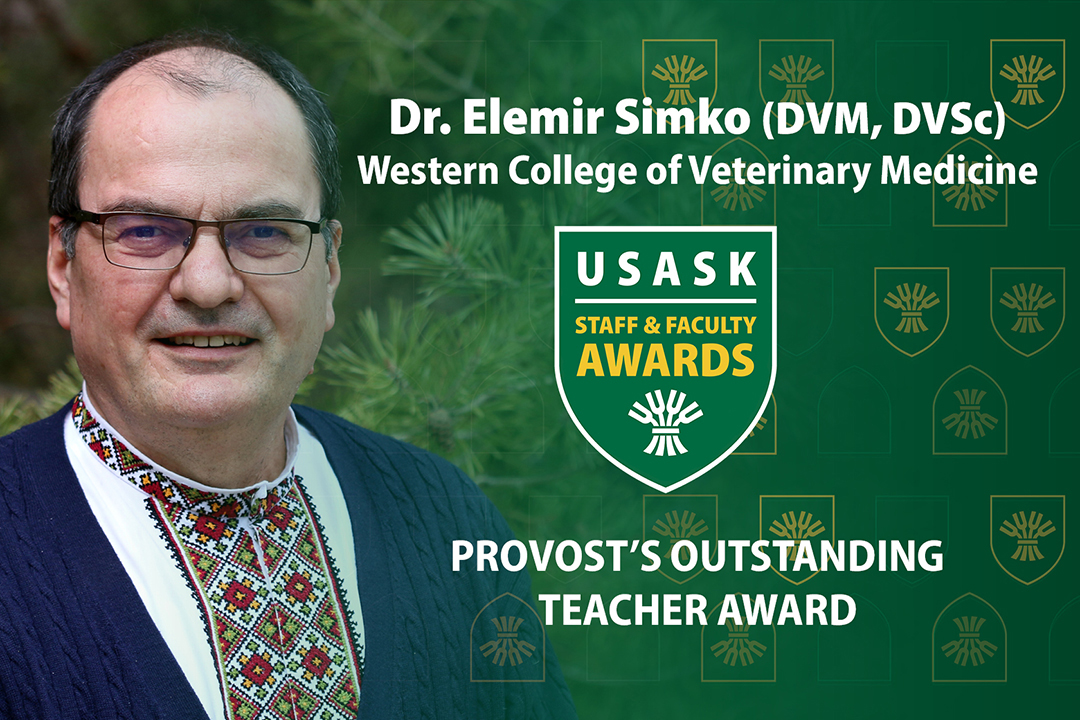
The tops in teachers
Dr. Elemir Simko (DVM, DVSc,) believes that if you do what you love, you’ll never work a day in your life.
By Jeanette NeufeldThe board-certified veterinary anatomic pathologist has been part of the WCVM faculty for nearly 23 years. He is a professor in the college’s Department of Veterinary Pathology and leads the college’s thriving honey bee health research group.
Simko, who is Ukrainian/Rusyn and was born in the former Yugoslavia, began beekeeping in his teenage years. His hobby eventually turned into an integral part of his decades-long research career.
During his time at the WCVM, Simko has become a beloved teacher of veterinary pathology for both undergraduate and graduate students and is well known for his rigorous and encouraging teaching style.
In recognition of his dedication to his students, Simko will receive the 2022 Provost’s Outstanding Teaching Award on June 1.
This annual award celebrates exceptional faculty members who demonstrate excellence in teaching and dedication to their students.
Simko says that part of what motivates him as a teacher is to teach as he would like to be taught.
“At our college, we have the best students from three western provinces and the northern territories. They are hungry for knowledge, eager to learn and ready to be challenged,” says Simko, who also received the USask Provost’s College Award for Outstanding Teaching in 2014.
He believes his pupils often develop a “love-hate relationship” with him as a teacher. No matter how they feel about him, Simko’s goal is to provide all of his students with a strong foundation in veterinary pathology for their medical education and professional career.
“Dr. Simko has found a way to teach veterinary pathology in a manner that ensures students are exceptionally prepared to enter the world of veterinary practice,” says Dr. Susantha Gomis, head of the WCVM’s Department of Veterinary Pathology.
In addition to the positive feedback and success of his students, Gomis says Simko’s honey bee work plays an important role in sustainable agriculture — pollinators such as honey bees have an integral role in crop production.
In response to the need for veterinarians to oversee antimicrobial use in honey bees, Simko created the first honey bee health program for veterinary students at any North American veterinary college.
Q & A with Dr. Elemir Simko
What motivates, inspires or excites you about your work?
A sparkle in a student’s eyes when they learn something new, make a first discovery or publish a first paper. There is no greater professional satisfaction than helping students to achieve their goals.
Tell us about a mentor or supporter who made an impact on your career.
I was blessed to have many great teachers and mentors; those who encouraged or even demanded my maximal efforts and performance have “a special place” in my memory, and I try to imitate and emulate them. Dr. Brian Wilcock and Dr. Tony Hayes — both professors emeriti at the Ontario Veterinary College — had a profound impact on my teaching and research, respectively.
What is one piece of advice that you would give to students, colleagues or others in your field?
“Docendo discimus” (Seneca, 4 BC-AD 65). “By teaching, we learn.”
